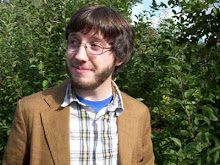Last Monday, I went to see "Shutter Island," the new Scorcese movie starring Leonardo DiCaprio and Mark Ruffalo. I was a little wary, because some of the reviews were less than stellar, but everyone I personally know (the opinions that matter a lot more to me) said it was fantastic, so I went into the movie cautiously optimistic. I was not disappointed.
From the first scene, with the two US Marshalls on a ferry to the titular island, the aesthetic of the movie is unlike most modern movies. There's a fantastic use of rear-projection that gives the movie--set in 1954--the look and feel of a movie of that time. There's a little bit of backstory, where we learn DiCaprio's wife died in a fire and that he's never worked with his partner before, and then they arrive at the island, which houses the mental institution where the protagonists are going to investigate a missing person. The music at this point gets a little overwhelming, which might be my only complaint. I think I understand what he was doing, though--with the music blaring, it's easier for the movie to disorient the audience.
There's a lot going on in the movie, with DiCaprio's character flashing back frequently to the liberation of Dachau, as well as imagining his deceased wife, who was killed in a fire, giving him instructions. Scorcese seems to want to fully explore every possibility for the movie to take before revealing the ending, so there are many diversions and discussions into the possibility that the mental hospital is serving as a site for medical experimentation, that the arsonist who killed DiCaprio's wife is a secret prisoner on the island, and that the hospital's administrators have brought DiCaprio onto the island because they know he's on to them. There's a storm, the power cuts out, and DiCaprio starts to question reality. I won't spoil anything of the ending, but I will say that Scorcese's ability to constantly increase the tension until the film reaches a breaking point is really incredible. By the time the Marshals find themselves in "Ward C," home of the most dangerous criminals, the tension and unease makes the slightest movement onscreen shocking.
I love watching a movie by a director clearly knows a lot about film history and is not afraid to show their love of classic movies in a new work. This movie, while definitely a Scorcese film, has the feel of many Hitchcock movies, and seems to drop little references to many of them. There's a scene that reminded me a lot of "Vertigo," while another reminded me of "Spellbound," and I like that Scorcese can pull of those references without using them as a crutch. I will give you one word of advice if you're going into the movie: pay careful attention to the editing, and watch the scene where they're interviewing patients very closely.
Friday, March 5, 2010
Friday Films: Shutter Island
Labels:
Friday Films,
Movies
Subscribe to:
Post Comments (Atom)

No comments:
Post a Comment